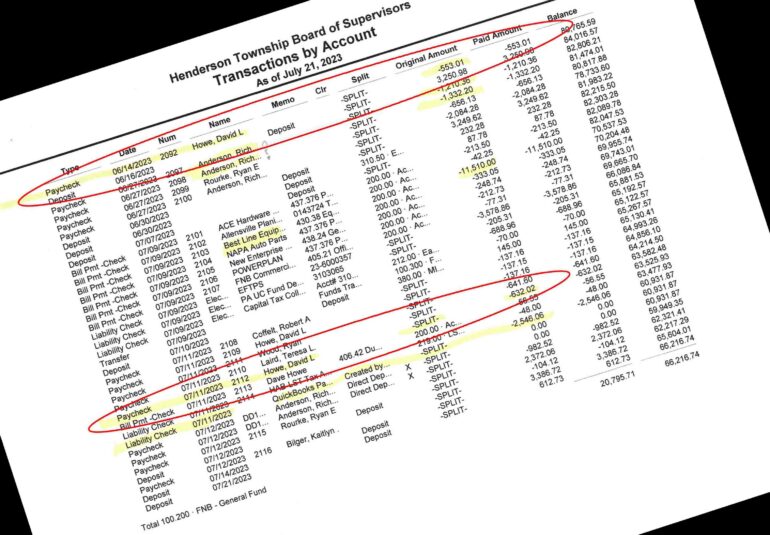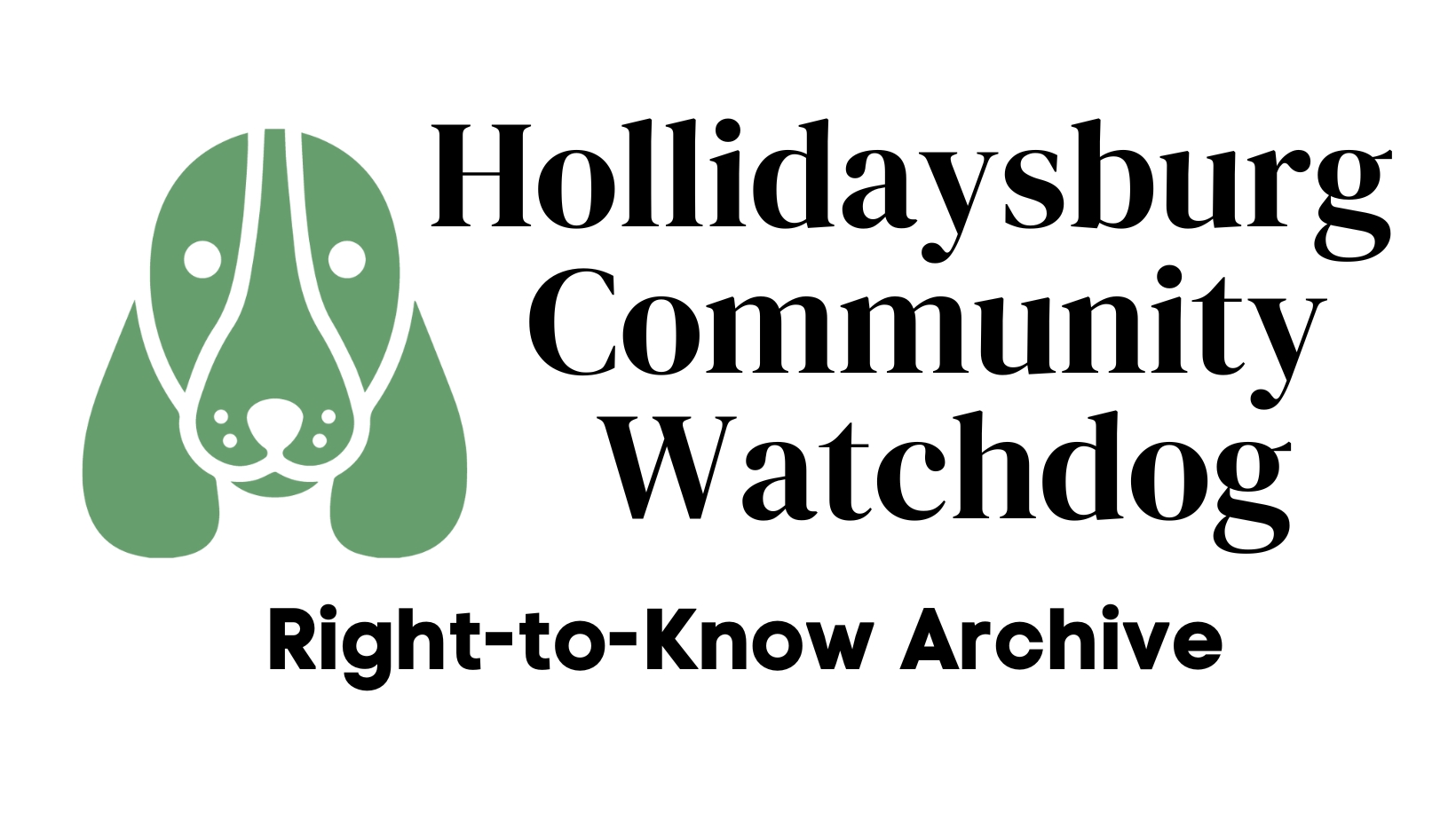
The complaint
As Hollidaysburg Community Watchdog (HCW) is the only organization of its kind in this part of the state, we’ve received an increasing number of complaints from outside Blair County. In August of 2023, citizens of Henderson Township (Huntingdon County) approached Watchdog staffers with misconduct allegations against their township supervisors. These included:
- Payment irregularities, specifically in the compensation of Township Supervisors Robert A. Coffelt and David L. Howe. Excess payments of several thousand dollars a year were found in the Township books, with nothing in the township minutes or other public records to justify them.
- Abuse of public resources by the township “Roadmaster”, who they allege was using township equipment and materials as if they were his personal property. They provided a video of what they said was a Township construction vehicle trundling up to a private residence to do road resurfacing. They also told us that at least one township road had been deeded over to a private party without any public hearings or other requisite process, and pointed out a record in the Township minutes where the new Township solicitor stated that the transfer had not been done lawfully.
- Systemic violations of the Sunshine Act by the supervisors, specifically that they had conducted “basement meetings” without public notice at which official business was discussed, that they had executive sessions not noted on the agenda, and that there were many implemented official actions, undocumented in any public record, that could not have been authorized outside a properly noticed public meeting.
- Failure to maintain public roads throughout the township, despite what appeared to be ample funding for the purpose from the state.
The RTK
The public records published below were obtained not through a Watchdog RTK, but through a records request placed to the township by Henderson resident Peg Vlasak, who was exasperated with the state of local roads and wanted to see how public money was being spent on them. The Township provided her with spreadsheets exported from its Quickbooks software showing financials from January 2020 through August 2023. (The notations and highlightings on the records published below were made by Ms. Vlasak and other Henderson citizens, not the Watchdog.)
The Records
According to 1933 Act 69, supervisors in a second-class township like Henderson “may receive as compensation an amount not in excess of… $1,875” per year. The money is intended as a stipend, not a salary, to cover the incidental expenses associated with official tasks.
The public records show that between January 2020 and August 2023, Howe and Coffelt received “paychecks” totaling $15,329.37 and $9,268.50, respectively. Howe alone received more than both of them combined would be entitled to under Pennsylvania Law in four years.
It would be lawful for Mr. Howe, who is 72, to be employed by the Township in a separate capacity at a reasonable wage. Nothing in the records or the Township minutes indicates what this employment might be. It would also require an explicit decision taken at a properly noticed public meeting to hire him. No such meeting occurred.
It is also possible that the payments were erroneously tagged as “paychecks” and that they were actually reimbursements of some kind. But the size and frequency of such payments casts doubt on this explanation. Moreover, the records show that Howe and Coffelt also received an additional $4,569.52 in “bill payment” checks for a variety of expenses including “mileage”, “office supplies”, and even “taxes”. This, too, is highly irregular — most municipalities manage to pay vendors for goods and services directly, rather than through its supervisors — and the “mileage” entries appear to use a rate higher than the standard rate of 65.5 cents per mile.
Watchdog interaction with officials
After carefully reviewing the material, the Watchdog decided that the intervention of law enforcement was warranted. We also contacted the Henderson Township Solicitor Attorney Greg Jackson by email and registered letter. The September 13, 2023 letter is published below. Attorney Jackson never replied.
The Watchdog contacted the Henderson treasurer, Teresa Laird, to ask who was serving as Township auditor, as that information was not published on the Township website. Once Ms. Laird realized we were investigating unexplained payments, she turned hostile and defensive. She provided no information, except to say “there are invoices for everything.” No invoices had been provided to Ms. Vlasak.
At a subsequent township meeting, Mr. Howe publicly complained that the Watchdog had called to harass him. No one in the Watchdog has ever telephoned or spoken to Mr. Howe.
The Watchdog facilitated an official complaint from Ms. Vlasak to the Pennsylvania State Police in Huntingdon. Upon advice from the State Police trooper assigned to the case, we contracted a forensic accountant she recommended to examine the Township books. Earlier this month, we were informed that the State Police had engaged the Inspector General’s office for assistance.
Auditor general RTK
Like many small municipalities, Henderson Township receives state subsidies for its employee pension plan. That requires a periodic audit from the State Auditor General. We found the Henderson Audit for January 1, 2018 through December 31, 2022 on the Auditor General’s website. It gave the Henderson Plan a general pass, but said that the Township had been overpaid by the state by about $2,000 and that the Auditor General’s office was awaiting reimbursement. It also noted a finding of “Inadequate accounting/reporting over activity of the pension plan.”
We wondered whether the “paychecks” received by Howe and Coffelt might have translated into pension payments, which would clearly be unlawful. We filed an RTK with the Auditor General asking for the underlying data in the audit (we’ll publish this and the response within a few days). The response was filled with denials and redactions, but did seem to indicate that there were only two active employees enrolled in the plan, which meant that neither Howe nor Coffelt were receiving pensions. The response also included communication between the Township and the state agency well worth reviewing.
Conclusion
- The Township disclosed a significant portion of the records requested by Ms. Vlasak, though by its own admission did not provide “invoices” that justified the very unusual payment records found in the books. It earns a B- for its compliance with the RTK Law.
- At the very least, the Township books are in a state of disarray. They appear to show payments to the supervisors well in excess of their allotted stipend. Even if it turns out that these were not really “paychecks” as categorized in the records, but reimbursements of some kind, the appearance of impropriety is overwhelming. The large number of “bill payment” reimbursements made to the supervisors also invites scrutiny.
- A thorough investigation by law enforcement is warranted.


